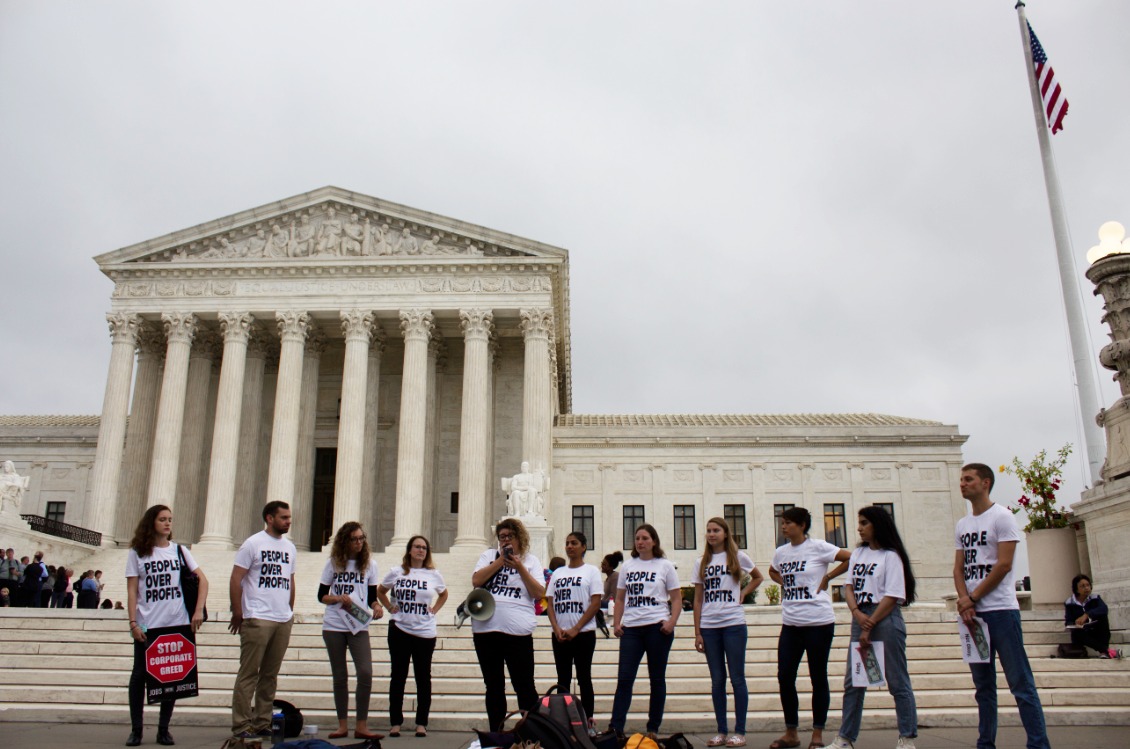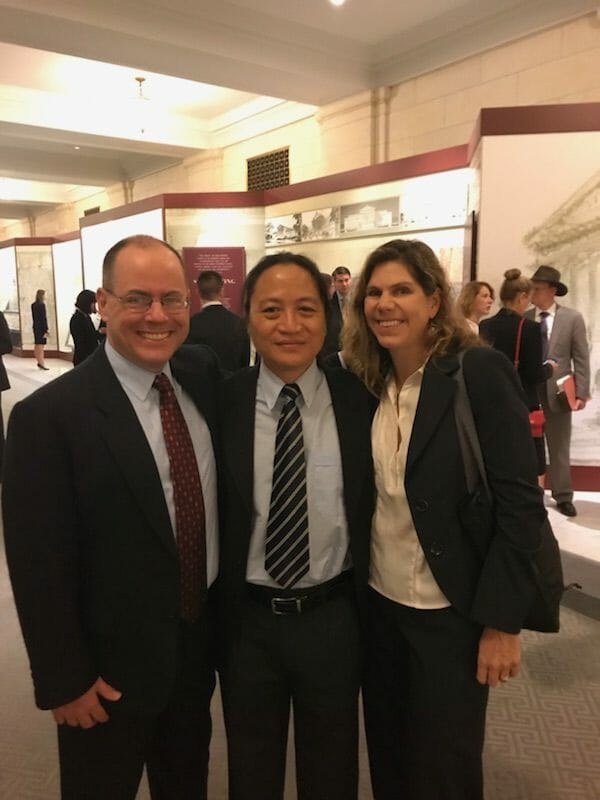Last week we supported the plaintiffs and counsel in a Supreme Court case that is revisiting the Alien Tort Statute (ATS), Jesner v. Arab Bank. We submitted an amicus brief (along with many other organizations), watched from the audience, and participated in an action outside of the Supreme Court.

ERI and ICAR host a protest outside the Supreme Court before the oral arguments begin.
On the surface, this case is about plaintiffs alleging that Arab Bank helped finance terrorism in Israel. According to the complaint, Arab Bank deliberately helped terrorist organizations and their proxies to raise funds for attacks and make payments to the families of “martyrs.” The plaintiffs further allege that Arab Bank used facilities here in the United States – including a branch in New York – to support the terrorist organizations.
Corporations commit harms. When they are not held accountable for these actions, that compounds the violation – the victims suffer both the injury itself and a denial of their right to a remedy, a violation of both domestic and international legal principles. And the companies also receive an unfair advantage, enabling them to earn profits at the cost of individual rights. Both innocent victims and companies that play by the rules suffer.
But this case is also about something else. Something that we know a lot about- the Alien Tort Statute. The ATS permits non-Americans to sue in U.S. courts for violations of international law, including terrorism and human rights abuses, and is key to holding corporations accountable.
In the 1990s in Myanmar…
In the early 1990s, two multinational oil companies—Total of France and Unocal of the United States—formed a partnership with the Myanmar (Burmese) military to exploit natural gas reserves in the Andaman Sea and build the Yadana gas pipeline into Thailand. Military units provided security and labor for the project. In carrying out its part of the deal, the army transformed the area into a highly militarized pipeline corridor, resulting in forced labor, forcible relocation of villages, torture, rape, extrajudicial killings, and attacks on indigenous and ethnic minority peoples. Big oil had partnered with a pariah military junta, and together they were getting away with murder.
At the same time, two young U.S. law students and an exiled human rights activist from Rangoon were determined to make sure that the oil companies were held accountable. On the border in Thailand, they decided to join forces and establish EarthRights International. But how?
On one hand, Ka Hsaw Wa, a young man from the Karen ethnic minority who at 18 had been jailed and tortured by the Myanmar government, trained a team of local human rights investigators for a secret journey across the border into the pipeline region where they began their listening project. One by one they sat down with villagers who had experienced or witnessed human rights abuses at the hands of the Myanmar military. Using pencils, small notebooks, tape recorders, and disposable cameras that they could hide and destroy at a moment’s notice, they collected first-hand testimonies from hundreds of victims and witnesses who lived in the pipeline corridor or who had fled to the Thai border to escape the abuse.
On the other side of the planet, the two law students, Katie Redford and Tyler Giannini, pored over their law school textbooks in the U.S., seeking a legal route to end the pipeline abuses. Their professors and others told them that there was no solution: corporations were only subject to the laws of the land in which they were operating. In Myanmar, where the military ruled with an iron fist, this meant the oil companies were subject to martial law, which the generals defined as “no law at all”. Unocal—like most multinational corporations operating outside their home countries – believed that it was above the law. The globalization of markets and economies had not led to a corresponding globalization of justice, and the people of Myanmar were paying the price for a huge international legal loophole.
But they believed that it was possible.
We used the Alien Tort Statute to sue Unocal in the United States, for international human rights violations, on behalf of victims of these abuses. And we eventually won.

ERI Founders (from left) Tyler Giannini, Ka Hsaw Wa, and Katie Redford attend oral arguments at the Supreme Court for Jesner v. Arab Bank.
ATS Revisited
In Jesner v. Arab Bank, the Supreme Court will consider whether the Alien Tort Statute can continue to provide an avenue to deliver justice to victims of corporate harms.
If corporations cannot be sued when they create widespread human rights violations and environmental damage, then who will? It raises the question of what kind of society we want. Do we want to live in a world where corporations can get away with murder and destruction, while it is left to ordinary citizens to pick up the pieces?
It is in the interests of the public that the Supreme Court permit corporate liability under the ATS because corporations must not have rights without responsibilities.






